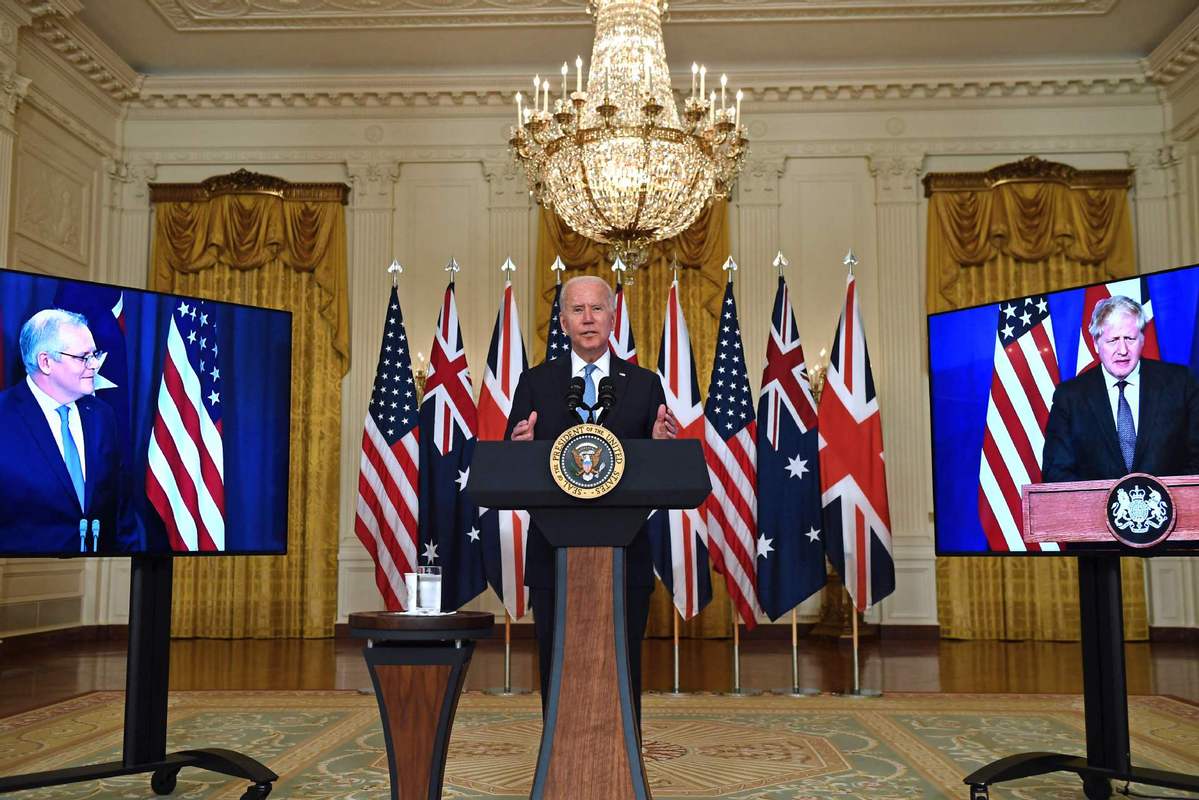AUKUS appears to weaken Western alliance
By Harvey Morris | China Daily Global | Updated: 2021-09-24 09:24

The abrupt announcement of a new United States-United Kingdom-Australia security partnership has been met with outrage from France, a key Western ally that appears to have learned of the deal from media reports, like the rest of us.
However, a more widespread reaction has been one of bemusement. What is the AUKUS partnership for? And why now? Is it just about supplying the Australians with state-of-the-art submarines, or is there a wider agenda?
UK Prime Minister Boris Johnson appeared torn between whether to highlight its supposed commercial or strategic benefits. "The AUKUS alliance will bring us closer than ever," he said, "creating a new defense partnership and driving jobs and prosperity."
The submarine deal is the only item on a so-far unspecified agenda aimed at protecting and defending the partners' shared interests in the Indo-Pacific region.
It involves the Australians dumping an existing deal to acquire conventionally powered submarines from France in favor of a US-UK nuclear-submarine alternative. The failure to inform Paris in advance led to the recall of the French ambassadors to Washington and Canberra.
Calling it a "stab in the back" by three of France's closest allies, French Foreign Minister Jean-Yves Le Drian accused them of "duplicity, a major breach of trust and contempt".
China is the ostensible target of the new pact. Foreign Ministry spokesman Zhao Lijian said the establishment of AUKUS risked intensifying the arms race in the region and undermining international nuclear nonproliferation efforts.
Leaders of all three AUKUS partners may have hoped to make domestic political capital out of the defense deal. If so, they appear to have underestimated the reaction, which has ranged from furious to skeptical.
CNN analysis on what it called President Joe Biden's "China fixation" opined that "it is perhaps a commentary about waning US prestige as the dominant global power … that so many (US) leaders spend so much time defining the country against the next great US adversary".
Biden has given the impression that he has a narrow interpretation of US interests and cares little for how his actions might complicate the political position of allied leaders, according to CNN's Stephen Collinson.
For the UK's Johnson, AUKUS offers the opportunity to recycle his ill-defined post-Brexit "Global Britain" agenda. But, as commentator Simon Tisdall pointed out in the UK newspaper Observer, "his policy increases UK vulnerabilities in a region where it has scant influence and less control, for little tangible gain".
In Australia, Prime Minister Scott Morrison may have hoped that the announcement of a landmark security deal would elevate his country's status and his own reputation, badly hit by his handling of the COVID-19 crisis.
However, his junior partner status at the top table was further reinforced when Biden appeared to forget his name during a news conference to announce the new defense pact.
Reaction from elsewhere in the Asia-Pacific region suggested that even friends of the US would feel less, rather than more, secure as a consequence of AUKUS.
New Zealand, a member of the Five Eyes intelligence alliance along with Australia, Canada, the US and the UK, was left in the dark as much as France ahead of the pact's announcement.
Having been frozen out of the AUKUS project, New Zealand is now likely to be drawn more closely to the European Union and what is seen as its more balanced approach to relations with China.
EU officials were irked that the AUKUS announcement eclipsed the launch of a policy paper the same day outlining the European bloc's engagement with the Indo-Pacific region in a range of fields, from climate change to trade.
The US-UK-Australian announcement seems equally ill-timed in relation to the United Nations General Assembly session and the even more vital 26th UN Climate Change Conference of the Parties (COP26), which will begin on Oct 31 in Glasgow.
For those US allies hoping for wider international engagement from Washington under a new president, the new security initiative seems like a continuation of the America First strategy pursued by Biden's predecessor.
In the short run, at least, it appears to weaken rather than strengthen the wider Western alliance, particularly after the US was accused of failing to consult with close allies over the bungled withdrawal from Afghanistan.
As the world faces existential challenges, such as climate change, the US and its two junior partners appear to have opted for short-term Cold War-style tactics over a cooperative global strategy.
The author is a senior media consultant for China Daily UK.
























